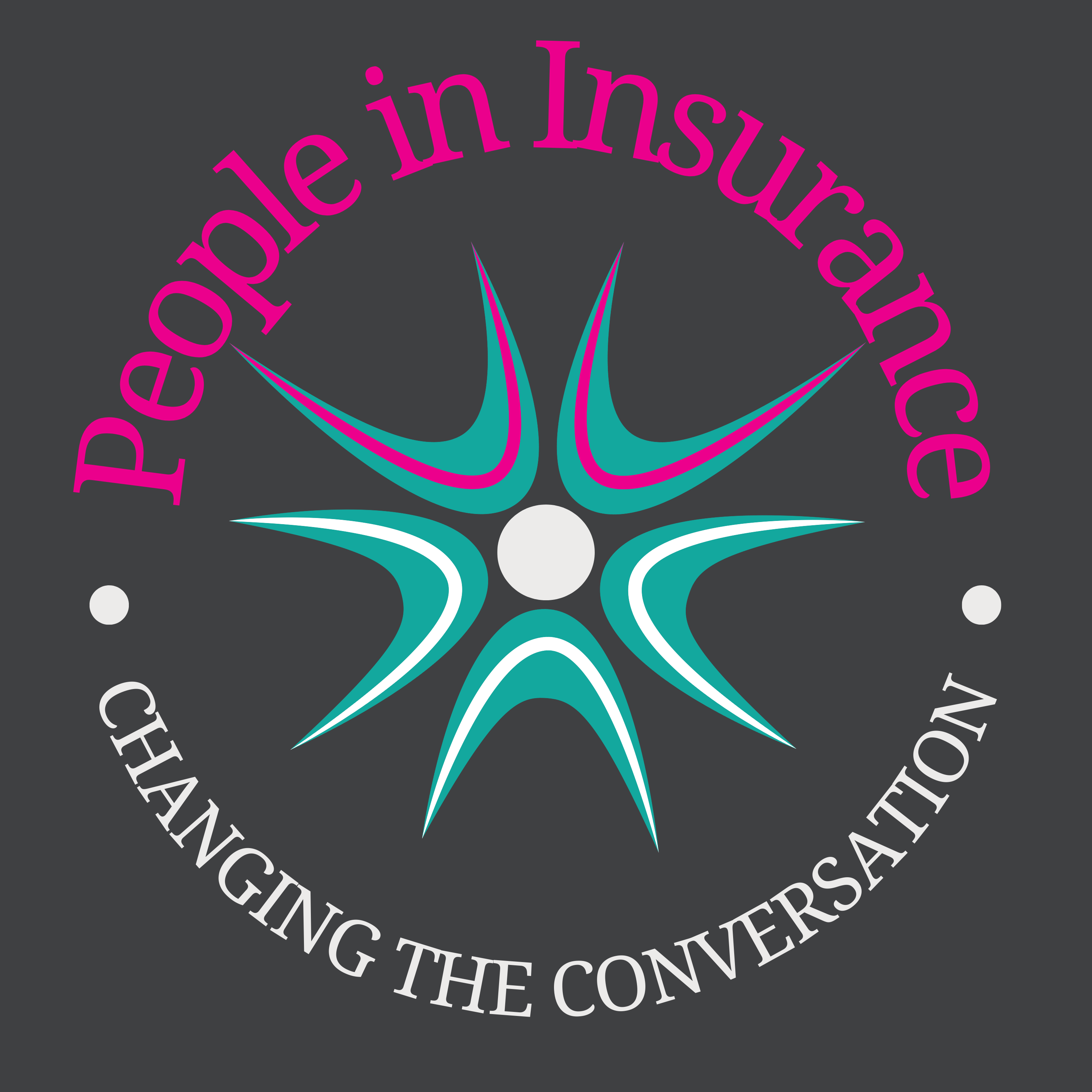
31.2K
Downloads
128
Episodes
Welcome to People in Insurance: Changing the Conversation Join us as we delve into the dynamic intersection of diversity, culture, and technological innovations within the insurance industry. Listen in as Host, Sarah Myerscough, Chief Ideas Officer at Macaii, sits down to talk with trailblazers, thought leaders, and innovators who are reshaping the very fabric of insurance. Here, we bring you stories that not only redefine the narrative but also offer a fresh perspective on the evolving landscape of insurance. From ground-breaking initiatives to transformative insights, we’re your trusted guide through the winds of change. Tune in to People in Insurance, brought to you by Macaii, and stay ahead of the curve in the ever-evolving world of insurance.
Episodes
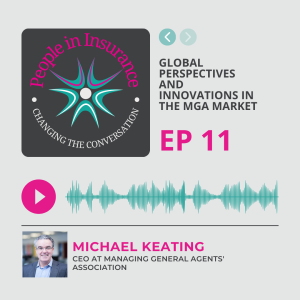
Tuesday Jul 02, 2024
Tuesday Jul 02, 2024
In this episode of Changing the Conversation, we sit down with Mike Keating, CEO of the Managing General Agents’ Association (MGAA), to explore the dynamic world of MGAs and their evolving role in the global insurance landscape. Mike shares insights into the growth and challenges within the MGA sector, the importance of strategic partnerships, and the exciting innovations driving the market forward. We also delve into the MGAA's rebranding efforts and their annual conference, which highlights the theme "The Power of Partnerships." Additionally, Mike discusses the critical role of the next generation in the industry and the importance of attracting young talent to the world of insurance.
Quotes:
"The MGA community is truly global and continues to grow at a very fast pace, with significant developments in the US, Canada, UK, and Australia." Mike Keating
"We've seen excellent insure tech MGAs launching worldwide. However, the challenge often lies in balancing investment in technology with effective product distribution strategies." Mike Keating
"Never take partnerships for granted. Understanding and aligning the objectives of all stakeholders is critical for success in the MGA ecosystem." Mike Keating
"We have a moral obligation to showcase how exciting and dynamic the insurance industry is. From insuring sports stadiums to Formula One, there are endless opportunities for young professionals." Mike Keating
Resources:
Managing General Agents’ Association (MGAA): www.mgaa.co.uk
MGAA Annual Conference: www.mgaa.co.uk/mgaa-conference-2024/
MGAA Podcast - MGA Conversations: https://mgaaconversations.podbean.com/
About the Guest:
Mike Keating is the CEO of the Managing General Agents’ Association (MGAA), where he leads efforts to support and promote the MGA sector within the insurance industry. With a career spanning over three decades, Mike has a wealth of experience in insurance, having held senior roles at various prominent organizations. Under his leadership, the MGAA has grown to represent over 230 members, placing billions of pounds into the UK and Irish markets. Mike is passionate about fostering innovation, building strategic partnerships, and advocating for the next generation of insurance professionals.
About the Host
Sarah Myerscough is the Chief Ideas Officer at Macaii, formerly Boston Tullis. She hosts/co-hosts several podcasts and is known for her knack in connecting with people. Sarah excels in bringing out the best for video, podcast, and live events, helping clients showcase the human side of their business.
Sarah is passionate about the evolving dynamics of the insurance industry and enjoys conversing with innovators, trailblazers, and long-term advocates of change.
Website: www.macaii.co.uk
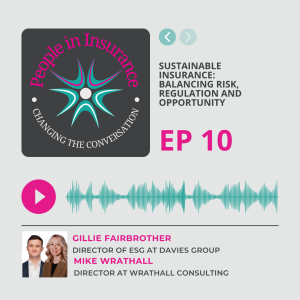
Tuesday Jun 25, 2024
Tuesday Jun 25, 2024
What responsibility do small insurance firms have to implement sustainable practices, and encourage their clients to do the same? What initiatives can SMEs put in place to cut down on their carbon footprint without compromising their bottom line? Or is a transition towards sustainable efforts ultimately commercially beneficial?
At Macaii we believe that podcasting is the best way to learn, and this episode of Changing the Conversation is a testament to that endeavour. We are thrilled to be speaking with Gillie Fairbrother and Mike Wrathall in a highly engaging and informative episode covering the importance of embracing sustainable practices as an industry, and the practical steps smaller firms can take to do so. This conversation cuts through the buzzwords and vague broad strokes discussions about a need to create change, highlighting the profound responsibility and the various opportunities that sustainability represents for our industry.
Quote of the Episode
“The insurance industry as a whole has a massive role to play in sustainability. It's an investor. It's one of the biggest investor groups in the world. It's an enabler of business. So, whether you're an oil rig or a new wind farm, you need insurance to get that project off the ground. What the insurance industry chooses to insure is what happens, effectively. So, if the industry moves away from insuring so-called ‘dirty economy’ things over a period of time and moves towards insuring new areas that are breaking ground, it can really enable those new areas, new climate technologies to get off the ground, and it can help phase out the other areas.”
When assessing our sustainable responsibilities as an industry, it is key that we examine not only the direct, first-hand carbon footprint of our own businesses, but also those of our clients. By insuring our clients’ businesses, we are effectively interconnected with their sustainable efforts, or lack thereof. By insuring businesses that deploy or harvest fossil fuels, we enable them and must take some responsibility for the damage they cause to our environment. Equally, this presents an opportunity. If we can encourage our clients to transition towards new practices and green technologies, we can precipitate extensive, sustainable change across an array of businesses, industries and economies.
Key Takeaways
As an industry, we have the power to nudge the business community in the right direction with regards to sustainability. We can use policy terms to behaviourally transition clients away from outdated practices, ratcheting premiums up and down in response to sustainable endeavours. Yet, whilst we undoubtedly hold significant power in the sustainability conversation as an industry overall, our economy is primarily comprised of small businesses (99%) which may feel somewhat powerless to contribute anything significant beyond compliance with sustainability regulations. The same is true for small insurance firms. Both Gillie and Mike affirm that firstly, it is key to identify what your business’ exposure is, and identify where to play in the sustainability space. Could your business cover a new or growing area, such as climate tech or wind farms? Can you incorporate sustainable efforts into your policies to encourage good behaviours in your clients?
Ultimately, our industry aims to make its clients’ businesses more viable and successful. If we are to encourage sustainable efforts in our clients, it is key to identify and illuminate the demonstrably positive impact of such practices on their bottom line. There will always be a range of client needs with regards to sustainability, with some simply wishing to comply with regulations, and others aiming to positively impact the planet through their work. Wherever our clients fall on that gradient of ambition, articulating the opportunity for their bottom line will always help to push them up that curve. Not only is sustainability ultimately a profitable enterprise. We are now at a stage economically where sustainable practices cannot simply be considered a tick-box ethical business practice exercise. A failure to implement these broadly across insurance and into the businesses we support as an industry will lead to catastrophic economic consequences in the not-too-distant future. As Mike argues, ‘the only real growth story for the economies and businesses of the century is going to be a sustainable one’.
Mike notes that we ultimately need to create a circular, regenerative global economy which forefronts sustainability. This will be highly reliant on digital connection, supplanted by an array of climate technologies that will become increasingly significant in years to come. In 2018, 9.1% of the world’s economy was circular, but in 2023, this had fallen to 7.2%. We cannot afford to go backwards. Ultimately, the insurance industry will bear the brunt when climate disaster strikes. We have a responsibility and a clear business incentive to be ahead of the curve and encourage our clients towards sustainable practices, today.
Best Moments/Key Quotes
“We [Davies Group] are actually rebranding to responsible business. But I'm very much keeping that in the background. Like our pillars don't change. We've always aligned with people, planet, and our purpose which aligns with ESG. But it's still everything we're doing as a business and our commitments aren’t changing. Let’s just get rid of the noise and get on with the work.”
“We have an opportunity as an industry to drive change. But it's hard for businesses to go ahead of regulation. And are we getting the right regulation?”
‘Digital connection is absolutely essential for the move to anything like a circular economy.’
Resources
Larry Fink’s 2024 Annual Chairman’s Letter - https://www.blackrock.com/corporate/investor-relations/larry-fink-annual-chairmans-letter
The Circularity Gap Report 2023 - https://www.circularity-gap.world/2023
About the Guest
Gillie Fairbrother is the Director of ESG at Davies Group, a professional services business which provides support to the insurance industry.
Gillie’s LinkedIn Profile: https://www.linkedin.com/in/gillie-fairbrother-2723a320b/
Mike Wrathall is an independent consultant working across sustainability and digital. His background is in digital transformation and sustainability strategy, having previously worked in Monitor Deloitte’s sustainability and climate strategy team.
Mike’s LinkedIn Profile: https://www.linkedin.com/in/michael-wrathall-03880a67/
About the Host
Sarah Myerscough is the Chief Ideas Officer at Macaii, formerly Boston Tullis. She hosts/co-hosts several podcasts and is known for her knack in connecting with people. Sarah excels in bringing out the best for video, podcast, and live events, helping clients showcase the human side of their business.
Sarah is passionate about the evolving dynamics of the insurance industry and enjoys conversing with innovators, trailblazers, and long-term advocates of change.
Website: www.macaii.co.uk
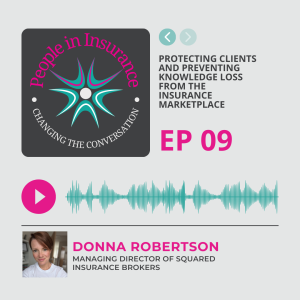
Tuesday Jun 11, 2024
Tuesday Jun 11, 2024
Has the Consumer Duty really changed the insurance landscape to protect customers’ best interests? Are any poor practices still slipping through the cracks? What changes can we implement as an industry to maintain a rich ecosystem of knowledge even as people retire?
In this episode of Changing the Conversation, we are thrilled to be speaking with Donna Robertson, Managing Director of Squared Insurance Brokers! She discusses the challenges of balancing personal responsibilities with your career ambitions, and how the industry needs to reformulate its approach to hybrid and remote working solutions. Furthermore, Donna is deeply interested in treating clients fairly. She elucidates her frustrations with the Consumer Duty which, she argues, has failed to institute many practical changes for customers.
Quote of the Episode
“Although there have been the technology advancements, I wouldn't say on a whole that the industry has evolved very much. I think we're still getting caught out by practices that we should have left in the dark ages. I know that the AFC are doing a huge piece on Consumer Duty. Has it actually changed anything in the landscape? I would say probably no, other than not selling GAP insurance anymore. I wouldn't say there's been other changes. The changes that I would like to see are on a more practical level.”
For Donna, beyond the more superficial shifts to our working practices and the transmission of data, generally our industry is little more efficient or accommodating to clients than it was when she began her career 25 years ago. She argues that clients continue to be subjected to unfair treatment via various unsavoury practices (notably in motor fleet and liability insurance) that need to be struck out.
Key Takeaways
A key area of concern highlighted by Donna which Consumer Duty has failed to address pertains to motor fleet insurance. She argues that it is very difficult for clients to switch their cover provider as the holding broker can retain the client’s information for a five-day period before releasing it, and thereby limit their options. This can create very challenging circumstances for business owners. For example, Donan cites an incident from within the last six months when she was approached by a client who had been put on an extension by their existing broker, and the terms of their cover had increased from £100,000 to £400,000. They had only two days to find an alternate solution, and the holding broker refused to release the confirmed claims experience to the client. Thus, the client was unable to get a hold of their own data to pursue alternate cover. Given that they had a fleet of over 100 vehicles, and the business couldn’t function without insurance, the client was forced to accept these terms, a deeply compromising position given the cost-of-living crisis. Insurance brokers should never be adding to the problems of clients, but the current state of motor fleet insurance effectively facilitates, or even encourages this.
Donna suggests that this cynical type of poor broking practice is becoming much less common, but the onus is on the FCA and other broking institutions to intervene and prevent further client mistreatment. Donna empathised deeply with this client and their powerlessness in this predicament. This is exemplary of what previous guest Sam White terms ‘right brain’ thinking. This is an empathy-led, creative approach more typically associated with women, which the industry would hugely benefit from a more active incorporation of. As a people-facing industry, everything we do is reliant on relationships rooted in trust, which Donna’s empathetic approach is more likely to honour than purely analytical, numbers-led ‘left-brain’ thinking.
Yet, due to the industry’s current flexible working infrastructure, it is incredibly difficult for women with children to balance this responsibility with their career ambitions. There are countless tales of women forced to leave their workplace as it failed to offer part time, remote, or flexible working solutions. While the pandemic led some companies to become more accommodating in this respect, there is still much work to be done. This departure of talent constitutes a significant loss of knowledge for the industry.
This is accentuated by the rapidly aging nature of the insurance workforce. As people retire, swathes of knowledge are further detracted from the industry. Donna advocates for new apprenticeship programmes to create a new foundation of insurance knowledge, but argues that the age limit for such schemes should not be capped. What if someone wants to try a new role or industry in their forties or fifties? These schemes would enable us to bring in such people and let their prior experience and expertise facilitate new ideas and alternative decision-making.
Best Moments/Key Quotes
“Just because you've got children, you still have your own career goals that you want to get. And it would blow my mind that I would speak to some women, and they’d say, ‘well, I've had to leave this workplace because they can't offer me part time or flexible working’. And what a loss! What a loss of that knowledge and talent.”
“[Our industry] is built on relationships and you build that trust with your clients. It can be a numbers game, but I do believe it's much wider than that. It's getting to know clients, and know what's going on in their world, to be able to then service them properly.”
“I think a lot of men have the stronger voice, and we [women], think that we don't have an opinion, or we don't have a good enough opinion. But women can sometimes look at it and see a different perspective, and see other things that maybe the other side, the more analytical brain, isn't seeing. So, speak out more often, your thoughts are good, and you might come up with something that nobody else has thought of.”
“If somebody wants to start a new role in their 40s or 50s, they've got transferable skills. So, let's make it easier for businesses and bring them in, especially when we know we’re going to have that loss of talent at the other end.”
Resources
Squared Insurance Brokers – https://www.squaredbrokers.com/
About the Guest
Donna Robertson is the Managing Director of Squared Insurance Brokers, which she launched in late 2019. She has 25 years of industry experience, and advocates for greater flexible working accommodations and fairer treatment for clients.
About the Host
Sarah Myerscough is the Chief Ideas Officer at Macaii, formerly Boston Tullis. She hosts/co-hosts several podcasts and is known for her knack in connecting with people. Sarah excels in bringing out the best for video, podcast, and live events, helping clients showcase the human side of their business.
Sarah is passionate about the evolving dynamics of the insurance industry and enjoys conversing with innovators, trailblazers, and long-term advocates of change.
Website: www.macaii.co.uk
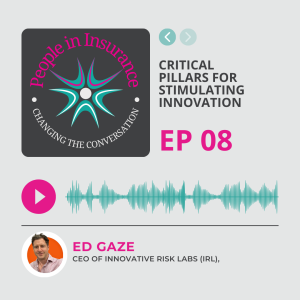
Tuesday Jun 04, 2024
Macaii S1 E008: Critical Pillars for Stimulating Innovation with Ed Gaze
Tuesday Jun 04, 2024
Tuesday Jun 04, 2024
How will Insurtech continue to reshape the industry in the coming years?
What factors, material and psychological, continue to curtail the insurance market from innovating at a steadier pace?
In this episode of Changing the Conversation, we are thrilled to be speaking with Insurtech trailblazer Ed Gaze! Whilst Insurtech is having a substantial impact on the wider market and facilitating innovation more broadly, many insurance businesses remain steeped in archaic traditional processes. Ed argues that this, along with considerable red tape around gaining capacity and distribution for new ideas, drains momentum from the market’s efforts to innovate. Ed suggests that businesses that wish to do so must assemble diversely minded teams who share a unanimous passion for experimentation and are motivated by the prospect of trying new ideas and alternative approaches.
Quote of the Episode
“I think, generally, we need to get everyone on better data. The better the data, the easier it is to move and change things, and understand what's going on. But the core thing [behind fuelling innovation] is having people [who are] motivated to make change happen and are not motivated to hold back. Sometimes we can be a bit risk averse. Insurers are in the business of risk, but they're also super risk averse. Trying to help them take a bit more measured risk in certain places would be really helpful.”
Ed observes that insurers’ attitude towards risk is somewhat oxymoronic – whilst we work to manage and evaluate the risks of our clients, we are very reluctant to take any risks to assist in this process. He notes that while there is a general need across the industry for greater access to and examination/implementation of data, the primary obstacle curtailing innovation is one of attitude.
Key Takeaways
The insurance industry is steeped in history, and as such, it is underpinned by an array of seemingly cemented processes. The digital revolution poses a significant challenge to this, as other financial services transition to data-first approaches, so too must insurance. Innovation is also often stymied by a reluctance to justify change. Profitable businesses may see no reason to innovate given their present success, and non-profitable businesses may lack the necessary funds to try something new. As such, for innovation to become more firmly cemented, there needs to be motivation within a given business to pursue change.
Ed notes that innovation must be underpinned by a passion for new ideas, a motivation to pursue them, and a no-judgement attitude towards mistakes when they happen. Innovation should be allowed to unfold quickly and fluidly, so that lots of new ideas can be tested and embraced or abandoned in quick succession. It’s key, therefore, to get the right people on board in a business, who are all motivated in the same way.
However, Ed highlights that diversity of thought is also crucial with regards to innovation. This can manifest in many different ways – for example, people from different cities or countries may therefore have contrasting life experiences, for example. Alternatively, people who studied radically different subjects at college or university will be equipped with unique skillsets and knowledge. When placed in a team of uniquely minded people, all inspired to innovate, great new ideas and approaches will emerge. Innovation, ultimately, is about applying ideas in new ways that are commercially viable. A diversely minded team will be far more equipped to pursue this end than a room of people who have all vaguely pursued the same path in life.
Ed’s long-term vision for the future of insurance is to make it easier for Insurtechs to innovate and for innovative ideas within corporates to be tested. There are considerable roadblocks to quick experimentation of ideas from capacity and distribution. Ed’s fast-paced approach to innovation is underpinned by a desire to learn more – even if an idea fails, so much can be gleaned from the attempt, hence why innovation in insurance is never wasted effort.
Best Moments/Key Quotes
“Sometimes if you don't give yourself a deadline and you just let things tick along, you just don't get that kind of drive to finish it. When we're all so motivated and pushing and working hard to do it, we then get that passion across to the other people within the insurer that need to approve it.”
“Culture is hugely important. You take a person in one business who's not able to get stuff done, put them in another business – same person, same skills – and they could be super successful because of the culture, because of people being willing to listen to what they've got to say, or being willing to experiment and learn.”
“Innovation is about applying the applying ideas in new ways that are commercially valuable. Innovation isn't necessarily about creativity. It's not about creating something brand new, necessarily. It's about taking things that are right there already, and applying them in a new way. And doing it in such a way that's commercially valuable.”
Resources
Innovative Risk Labs: https://www.innovativerisk.co.uk/
JustParent: https://www.justparent.co.uk/
About the Guest
Ed Gaze is a paragon of Insurtech innovation. Having managed the Lloyd’s Lab for four years, Ed has since become the CEO of Innovative Risk Labs (IRL), a broker which helps to launch new Insurtech MGAs in the UK. He is also the CEO of JustParent, the UK’s first parental leave insurer.
About the Host
Sarah Myerscough is the Chief Ideas Officer at Macaii, formerly Boston Tullis. She hosts/co-hosts several podcasts and is known for her knack in connecting with people. Sarah excels in bringing out the best for video, podcast, and live events, helping clients showcase the human side of their business.
Sarah is passionate about the evolving dynamics of the insurance industry and enjoys conversing with innovators, trailblazers, and long-term advocates of change.
Website: www.macaii.co.uk
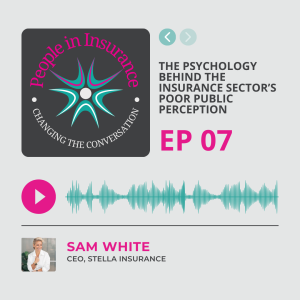
Tuesday May 28, 2024
Tuesday May 28, 2024
Why does the insurance industry continue to be plagued by a reputation that it is untrustworthy, exploitative and profit centric? What can we do internally and via our communications with the public to reorient this perspective and thereby foster a healthier relationship between customers and insurers?
An array of deep-rooted psychological factors continue to inform negative public attitudes towards insurance. The ramifications of these are multifaceted – active pursuit of a career in the industry is a rarity, hence our current recruitment crisis, and there are generalised misconceptions of what we really do. In this episode of Changing the Conversation, we are very pleased to be speaking with the prolific Sam White: entrepreneur, podcast host, and CEO of Stella Insurance! Sam dispenses her wisdom regarding the need for better communication both within insurance teams internally, and between the industry overall and the general public.
Quote of the Episode
“Everything is about relationships. Everything is about communication. When you have bad relationships with bad communication, it doesn't matter how smart you are, you won't solve problems because you'll be sat in a siloed box, and you won't be able to get engagement from other people. So, that piece around getting people to tap into their emotions and then communicate from a position of emotionality and not rationality [is crucial].”
For Sam, we must identify the emotional crux behind every issue our customers may face. Historically, insurance communications have been characterised by a tendency towards clinical, ‘rational’, thinking, which fails to acknowledge and respond to the real issues at hand. As a people-facing industry, we must embrace the human side of what we do. Thus, in our external engagements with the general public, it is paramount that we recognise when we make mistakes, and the efforts we are implementing to correct them.
Key Takeaways
As a frequent guest on Morning Live and BBC Radio 4, Sam uses this public platform to try and bridge the gap between presiding misperceptions of our industry, and what we really do. She argues that more people need to follow her lead and explain how the industry is responding to public frustrations and demands in universal terms. She notes a defensive tendency on behalf of the industry at large to avoid taking accountability of our failings. Sam suggests that, if we can openly acknowledge the errors we make as an industry, people may be more willing to listen as we strive to address and overstep them.
Using the public platform in this way to alter public perceptions of insurance may also facilitate our recruitment efforts. To get future generations engaged with the notion of a possible insurance career, we need to cultivate excitement, thrusting insurance into the mainstream. For example, Sam has partnered with former Married at First Sight cast member Jules’ shapewear brand – every time a customer purchases a Stella Insurance policy, they will receive an item of shapewear. This subtly draws insurance into the mainstream and creates a positive association for Stella and the industry overall. Sam is wary of the insurance industry’s efforts to communicate with the public about what we do. These are typically sallied by an alienating rhetoric only comprehensible to those already in the industry, which has no resonance for the general public.
Sam’s championing of the human side of insurance is not only geared towards our need to alter our public perception. She argues that the mass exodus of top talent from FTSE 100 companies is entirely unsurprising, and attributes it to toxic, dehumanising work environments which fail to recognise the psychological impacts of blame culture and dictatorial hierarchies. For Sam, the culture in corporate insurance environments is scaffolded by a clinical proclivity towards profit above all else, de-sanctifying the psychological safety of team members. Ultimately, people are finding themselves unwilling to continue working in such environments irrespective of how much they might be paid. As an industry we must learn how to foster psychologically safe environments, particularly as the next generation of insurance professionals, who have entirely different expectations regarding wellbeing in the workplace, begin to rise the corporate ladder.
Best Moments/Key Quotes
“I want us [as an industry] to be much more engaged with the public. When the BBC comes to me and asks me for comment, one of the most common things they say is, ‘We couldn't get anyone else to speak’.”
“I think people want to understand what's going on. I think if we can open up that conversation and be a bit more open to the criticism, then we'll do a lot better generally.”
“We do have a big job to do to make insurance a bit more fun, and sexy, and interesting. Despite the fact that it is in so many different areas, it has a really negative association with it. We're not coming together enough as an industry to go, ‘Okay, how do we tackle that?’”
“What I see in these large corporates is over the last couple of years, they've been under massive pressure… People have got to a point where they've gone, ‘I don't care how much you pay me, you cannot pay me enough to go into an environment where my humanity is completely ignored, where I get screamed at by somebody who has no emotional regularity’.”
“When you're under stress and you've got lots of stuff going on, that's when most teams have less contact, less communication. Everybody goes off into their silos. That's the exact opposite of what should be happening. That's the time that you have to double down on spending time together, on understanding each other, on having the hard conversations, because that's where you get to a better space.”
Resources
Human Business with Sam White Podcast – https://www.deezer.com/us/show/445082
book – about tribal instincts. you have a tribe of people that are like you – and a natural distrust of people that are not like you. hierarchies that are accepted and self-hierarchies that are not.
I Am (2010) – dir. by Tom Shadyac
About the Guest
Sam White is the CEO and founder of Stella Insurance, a financial services business offering insurance products tailored to women's needs. Sam is the co-host of BBC Radio 4’s ‘Toast’, and a regular on BBC One Morning Live, where she shares her insights into the current state of the insurance industry.
Sam’s LinkedIn Profile: https://www.linkedin.com/in/samwhiteentrepreneur/
About the Host
Sarah Myerscough is the Chief Ideas Officer at Macaii, formerly Boston Tullis. She hosts/co-hosts several podcasts and is known for her knack in connecting with people. Sarah excels in bringing out the best for video, podcast, and live events, helping clients showcase the human side of their business.
Sarah is passionate about the evolving dynamics of the insurance industry and enjoys conversing with innovators, trailblazers, and long-term advocates of change.
Website: www.macaii.co.uk
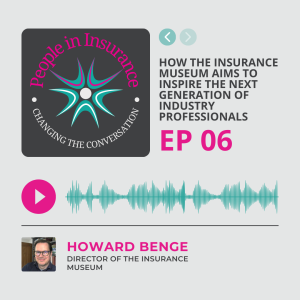
Tuesday May 21, 2024
Tuesday May 21, 2024
What is the Insurance Museum and who is it for? Can it help to reconstitute public perceptions of the industry and to educate children and young people about what we really do?
Given the rapidly evolving nature of our industry today, it’s easy to forget that our work rests on the shoulders of a centuries-old legacy rooted in the heart of London. The founders of the Insurance Museum intend to cultivate a renewed interest in this history and heritage amongst both industry professionals and the general public. In today’s episode of Changing the Conversation, we are thrilled to be speaking with Howard Benge, Director of the Insurance Museum, about the project’s creation, its intentions, and long-term ambitions.
Quote of the Episode
“When I first came into this [project], the first thing that that really hit me was how much sandstone, how much history there is. The history and heritage of the insurance sector is so broad and so deep.”
The Insurance Museum was established as a charity in 2020, with the intention of becoming a physical space in London SE3 to tell the global story of insurance from its birthplace. During his research for the project, Howard uncovered an immense array of fascinating material charting the expansion and development of Lloyds and the industry more generally, into what it has ultimately become today. Matching the primarily digital nature of insurance itself in 2024, the museum currently uses digital platforms (linked below) to bring the history of the sector to life.
Key Takeaways
The Insurance Industry aims to be inclusive in its outreach, and be suitable both for insurance professionals and the general public: anyone with an interest in the interest, but particularly children and young people. To this effect many components of its digital presence are targeted towards this demographic, with the intention of unlocking an early interest in the insurance industry. Howard notes that roughly 36% of us have chosen our career by the age of seven. The proportion of those children who would consider insurance as their future profession is slim to none – most likely do not know what insurance is, nor the profound extent to which it underpins the global economy.
Thus, the museum aims to inspire, educate, and in the long term, support the industry’s recruitment efforts, by making insurance a career that is actively chosen rather than one that it simply fallen into. If we can positively reinforce children or young people’s interest in insurance, we can begin to shift the tides regarding our industry’s ongoing reputational crisis.
To do so, the museum aims to explain the multifaceted nature of our industry through explorations of an interesting angle. Every child in England is taught about the Great Fire of London at the ages of 6/7, thus providing an ideal springboard with which to explore the importance of insurance, and the applications of numerous subjects through it. Howard emphasises that it is key to emphasise how insurance infiltrates everything we do – it is a fundamental, if typically unseen, facet of our daily lives, which is a very exciting prospect for children to consider. Meanwhile, amongst young adults, Howard suggests a need to tap into their interest in inequality and injustice. For example, presenting the industry from the angle of how the big insurers aim to tackle climate change could facilitate engaging discussions which may enlighten young people about a career they hadn’t previously considered or known about.
The museum ultimately intends to cultivate a deep level of engagement in insurance; to make it fun and compelling for young people, and also enriching and informative for older people and insurance professionals seeking to learn more about the history of their industry. It will not be a museum of policies and fire marks, but an inspiring space where stories are told.
Best Moments/Key Quotes
“The reason for the existence of the insurance museum… is to inspire and educate and support the recruitment process; bringing the really young kids to make insurance a career you choose, not one that you fall into.”
“What do we do with insurance today? When we grow up. we all have insurance. In fact, you could even extend that to ‘Insurance underpins our lives. From the moment you're born, you're covered by insurance.’”
“Don't think of it as a collection, but more of a space… that’s all about engaging. A real deep level of engagement, whether that is just having fun, understanding a bit more, spending valuable time, trying to understand other people's opinions. All of that…. It's going to be museum where we're going to tell all the stories: marine, aviation, fire, life insurance. We're going to look at those difficult stories as well… it’s a place where we’re going to celebrate insurance, and promote insurance, and get everybody in.”
Resources
The Insurance Museum: https://insurance.museum/
Insurance Museum – Fire Insurance Exhibition: https://insurance.museum/fire-insurance-gallery
Insurance Museum – Dr Nicholas Barbon: https://insurance.museum/rising-from-the-ashes/part-2#section-67442620
About the Guest
Howard Benge is the Director of the Insurance Museum, appointed in 2021. He has worked as a heritage professional for 25 years; in nine of which he took up several roles for the City of London Corporation, managing the Guildhall Library, various museums, Billingsgate Roman House and Baths, and the City of London Police Museum, amongst many others.
Howard’s LinkedIn Profile: https://www.linkedin.com/in/howard-benge-87a3092/
About the Host
Sarah Myerscough is the Chief Ideas Officer at Macaii, formerly Boston Tullis. She hosts/co-hosts several podcasts and is known for her knack in connecting with people. Sarah excels in bringing out the best for video, podcast, and live events, helping clients showcase the human side of their business.
Sarah is passionate about the evolving dynamics of the insurance industry and enjoys conversing with innovators, trailblazers, and long-term advocates of change.
Website: www.macaii.co.uk
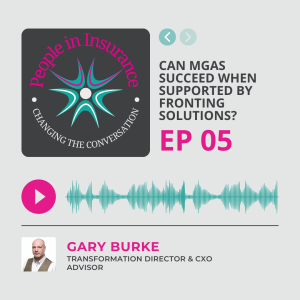
Tuesday May 07, 2024
Macaii S1 E005: A Horizontal View of Transformational Change with Gary Burke
Tuesday May 07, 2024
Tuesday May 07, 2024
We are very pleased to be speaking with Gary Burke, Founder of Rabbits From Hats, about the distinction between transformation and change, and how businesses can smoothly implement transformation projects. In conversation with Sarah Myerscough, Gary highlights the importance of adopting a ‘horizontal view’ of change if transformation projects are to achieve their intended goals for a given business.
Quote of the Episode
“Companies look at this stuff far too narrowly, far too vertically. They really need to just pause and look sideways, so they get more of a horizontal view. The organization does not exist in a bunch of disparate silos. It's all connected.”
When contemplating transformation projects, Gary postulates, it’s very easy for business leaders to view their organisations in terms of their composite parts, rather than as a cohesive whole. This misperception can lead to disaster; if a given transformation is not considered on a broader, company-wide basis, certain considerations may be left forgotten. As such, throughout the episode, Gary emphasises the need for a ‘horizontal’ view of change which considers how it might affect the business from every conceivable angle.
Key Takeaways
Gary pinpoints two fundamental issues typically encountered when insurance businesses implement transformational change:
- A lack of understanding about what transformation will involve
- Insufficient capability and expertise to deliver it
For Gary, both of these issues are generally derived from there being no overarching, wholesale, holistic view of the business and its innerworkings. This is further underpinned by a common misconception that ‘change’ and ‘transformation’ are functionally synonymous. Businesses adopt small-to-medium-sized change projects all the time, be it the adoption of a new software or the restructuring of a team. Such projects can impact how the business operates, hopefully to drive efficiencies, but without fundamentally altering it. Conversely, transformation projects impact the business at every conceivable level. As such, to tackle a transformation project with the mindset of a change project can never be successful.
Gary suggests that the senior leadership team must set the tone for how the company must behave throughout the transformation process. If several groups, perhaps with conflicting views and ideas, are to be involved in this process, a collective consensus on the intended outcome of the transformation project must first be reached. This establishes a base goal which everyone across the company can defer to. Subsequently, each team can collaboratively work backwards from this goal, to understand the key things needed to achieve it. Once the points of uncertainty about the nature of change have been smoothened over, this can be a non-contentious process – what will be the most effective way to achieve this transformational outcome given the resources held by the business?
To determine the success of a transformation project, a wide array of metrics must be consulted. A holistic approach to measuring success must also be adopted. This must be derived, first and foremost, from the baseline of what the business already has, prior to the implementation of the project. The success of transformational change can only be understood by reference to how the business previously used to function. There is a lot of hesitance, particularly in insurance, to attempt transformation projects. Gary argues that there is no empirical evidence to suggest that such programs inevitably lead to failure. Instead, he suggests, businesses must always understand in detail what exactly they are getting involved in by undertaking them, and consider how their innerworkings will be fundamentally altered as a result.
Best Moments/Key Quotes
“As long as you know the outcome, then that's the thing to focus on. The technology is an enabler. It enables you to do something in the best way possible, the most efficient way possible. So, as long as you can agree what needs to be done, then you can have conversations about how it needs to be done.”
“If an organization's doing anything, the whole point of doing it is for a reason. The specific outcome that you want from doing the stuff you're doing. So, if you've got a dozen people or a dozen different groups involved, you should be able to all agree on the outcome you want.”
“Calling something that's quite small… a transformation project gives the wrong impression, because it creates the idea that transformation is easy; you just do this and this and this. So ‘transformation’ is badly used [as a term].”
“There's a lot of stuff that companies can do and should do themselves to put themselves in a really much better position to actually start any transformation, rather than getting an army of consultants in from day one. The things that they [consultants] ask to be done, the organization should be able to do themselves at a fraction of the cost. They are just not aware that they are good things to do beforehand.”
Resources
A Transformation Lens: The Savvy Business Leader's Approach to Transformational Change by Gary Burke
Rabbits From Hats: https://www.rabbitsfromhats.co.uk/
About the Guest
Gary Burke is the Founder of Rabbits from Hats, a transformational change advisory and consulting firm. He has been working on projects in this space since the mid-90s, primarily in insurance but also in other sectors. In the last decade he has been focused first and foremost on general insurance and the London market, and in 2023, his book ‘A Transformation Lens’ was published.
Gary’s LinkedIn Profile: https://www.linkedin.com/in/gary-burke-transformational-change/
About the Host
Sarah Myerscough is the Chief Ideas Officer at Macaii, formerly Boston Tullis. She hosts/co-hosts several podcasts and is known for her knack in connecting with people. Sarah excels in bringing out the best for video, podcast, and live events, helping clients showcase the human side of their business.
Sarah is passionate about the evolving dynamics of the insurance industry and enjoys conversing with innovators, trailblazers, and long-term advocates of change.
Website: www.macaii.co.uk
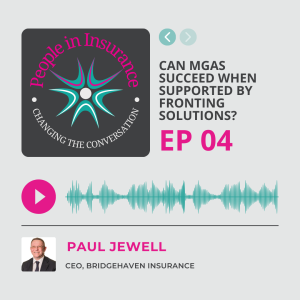
Tuesday Apr 30, 2024
Tuesday Apr 30, 2024
What are ‘fronting’ and ‘hybrid fronting’? How do they differ? And what unique opportunities can these solutions afford MGAs and the wider UK insurance market?
In this episode of Changing the Conversation, we are thrilled to be speaking with Paul Jewell, CEO of Bridgehaven Insurance, the first hybrid ‘fronter’ in the UK. At the forefront of this alternative distribution solution’s introduction to the UK market, Paul is well-placed to discuss the disrupting influence of fronting, having already made a sizeable impact across the pond in the US. He elucidates why fronting presents such a powerfully unique and profitable option to MGAs, and its benefits to the wider market.
Quote of the Episode
“Simplistically, [fronting] is just a term for capacity or an insurance solution… An insurance company acts on behalf of somebody else, usually a single, or multiple reinsurers. it’s very common for international companies, [such as] Pepsi Cola, a US-based company who may want an insurance solution in the UK, but they may have their own insurance solution provided by a US company. So, what they do is they have a ‘fronting partner’, a ‘fronter’, in the UK that ‘fronts’ for that business, i.e., issues the insurance policy, and they reinsure back to the US under the master agreement. That’s traditional fronting. It’s most common for multinationals and those types of organisations.”
Fronting is a hugely beneficial market solution, enabling multinationals to streamline their insurance provisions to ensure a continuity of cover across the various markets they operate in. Equally, this presents a big opportunity for those insurers, namely MGAs in the UK, who can provide this solution, as it grants them access to unique capacity derived from alternative markets they wouldn’t otherwise have operated within.
Key Takeaways
Hybrid Fronting slightly differs from the traditional approach outlined above. In contrast to the Pepsi example, in which the fronting company would reinsure 100% back to the US, a hybrid fronter would retain a variable amount of that risk themselves. Thus, through this model, the insurance company issuing the policy retains risk to their balance sheet. Furthermore, the hybrid fronting model is more focused on underwriting profit. Fronting for Pepsi and issuing a policy to reflect their US-based cover is a matter of compliance, as you’re not allowed to issue American policies in the UK. Meanwhile, a hybrid fronter retains some amount of that risk, so premiums and claims stay in the UK with that insurance company. Thus, hybrid fronters can benefit from hugely diversified portfolios, and a focus on profitability through partnership with a broad range of reinsurers.
Paul anticipates that fronting and hybrid fronting will become an increasingly powerful disruptor in the UK market. He argues that MGAs are particularly well-suited to operate in and benefit from this space by providing unique services and distribution in a more flexible and agile manner to traditional insurers, which aligns with the aims of prospective fronting partners such as Bridgehaven.
Additionally, he suggests that reinsurers themselves can also benefit from this type of distribution. If a reinsurer has relationships in other jurisdictions, and wishes to provide capacity to a particular customer group in an alternative market whilst remaining compliant in the UK, a partner can front for and retain risk on their behalf. Paul also notes that captives may be interested in this solution, particularly given the government’s recently asserted interest in making the UK a jurisdiction of choice for those subsidiaries.
Paul anticipates that many more fronters are likely to emerge in the UK in the next few years. The profitability of this approach has enormous potential in bringing new, diverse capacity to the UK market. He dismisses the notion that hybrid fronters will compete with one another for this capacity; by contrast, the disruption they will cause to the broader market through this solution will more powerfully hit the traditionally big insurance players.
Best Moments/Key Quotes
“MGAs are growing at a much faster pace than the traditional insurance sector because they're providing unique services, unique distribution, unique products, they're meeting customer demands, they're much more flexible and agile... So, we feel that over time, the hybrid fronting solution will actually be a quite an interesting disruptor for the UK market in providing different solutions that will fit some of the partners in the UK, particularly MGAs, which is growing space.”
“We have a dedicated model that supports MGAs. We are not attracting or targeting customer groups directly. We don’t service brokers directly, we only support through MGAs, so there’s a reduced conflict of interest.”
“I think hybrid fronting can bring alternative capital [and] advantages from additional commission profit shares. I think it gives much more flexibility to enable [MGAs] to grow the alignment of interest because there's reduced conflicts of interest with other distribution. I also think there's a potential better of transparency… Each party sees the same level of information. There’s no mystique.”
“Talk to us or talk to other fronting partners directly. There's nothing wrong with direct engagement. We don't have a prescribed way of doing it. The only thing I would encourage your listeners to understand is that there is a process to go through. Often, there needs to be things like business plans, data sharing, and information… [so] they need to be prepared for the conversation.”
Resources
Bridgehaven Insurance: https://www.bhvn-ins.com/
About the Guest
Paul Jewell is the CEO of Bridgehaven Insurance, with 35 years’ experience across various roles both UK-based and internationally.
About the Host
Sarah Myerscough is the Chief Ideas Officer at Macaii, formerly Boston Tullis. She hosts/co-hosts several podcasts and is known for her knack in connecting with people. Sarah excels in bringing out the best for video, podcast, and live events, helping clients showcase the human side of their business.
Sarah is passionate about the evolving dynamics of the insurance industry and enjoys conversing with innovators, trailblazers, and long-term advocates of change.
Website: www.macaii.co.uk
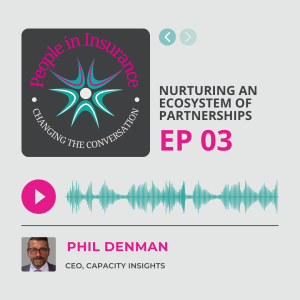
Tuesday Apr 23, 2024
Macaii S1 E003: Nurturing an Ecosystem of Partnerships with Phil Denman
Tuesday Apr 23, 2024
Tuesday Apr 23, 2024
In this episode of the Changing the Conversation, we are thrilled to be speaking with Phil Denman, Co-Founder and CEO of four-section MGA, Capacity Insights! In conversation with Macaii’s Sarah Myerscough, Phil explains his philosophy for establishing partnerships with experts external to the insurance industry, and how these can help us to keep apace with customer interests and regulatory demands.
Is it possible for any insurance company to address customer desires without delegating any tasks to external experts? As we rapidly transition towards digitisation, how do we keep an eye on the unintended consequences of new digital practices, particularly with new regulatory measures to consider? Having established what your company is good at and what your customers want, how can you align both of those propositions?
Quote of the Episode
“I see this modern, fast moving insurance market that we work in being a sort of an ecosystem of partnerships. Whether that's technology, whether that's people providing parametric claim settlement, or data services, whether that's partnering with different claims providers where we can. Instead of trying to be everything to everybody, being a leader in the delivery of high-engagement, subscription-type services, as a fully regulated entity, with all of the cost and rigour and robustness that comes with that. We may be compartment with people for some of the faster-moving engagement services, certainly in terms of digital health, digital assistance, digital claims services. We will come outside of our own organisation and partner with people for that, for that engagement layer.”
Phil suggests that the insurance market today will flourish or flounder on account of how quickly and effectively we can partner up with and incorporate the insights of experts external to our industry. Particularly with regard to technological proficiency and digital services, it is key that we can provide a platform that is easy and user-friendly whilst also mitigating any potential unintended consequences to satisfy the regulators. It’s impossible for us to be experts at everything, and outsourcing certain processes to people who can provide those areas will, Phil argues, be the differentiating factor that eventually keeps some companies afloat, and leaves others in the dust.
Key Takeaways
Our buying cycles have been completely reoriented by the high-speed nature of the Amazon business model and others of its ilk, fuelling an ‘I want it yesterday’ mentality underpinned by getting products quickly, with as little administrative hassle as possible. Yet, insurance is a complicated product. Phil suggests that delivering a such a simplistic customer journey necessitates a significant amount of complex work and technological expertise. Great products, he notes, are complex products, masked with a veneer of ease and simplicity from the client’s perspective. To facilitate this, Phil argues, it is essential that we begin to collaborate more with digital partners who can provide the expertise you might not have in-house.
‘We can’t be everything to everyone,’ Phil notes, and as such developing such partnerships will become a core means by which our industry can begin to meet these aforementioned customer expectations. Capacity Insights themselves have made many changes in this regard. Phil notes that the company has re-engineered its product process to begin with customer needs, and with regulatory expectations in mind, thereby deploying a 360-degree view of the various levels that products need to deliver on.
Data management is a crucial aspect of delivering a smooth customer journey. While we have access to more data than ever, its oversaturation can often prove a hindrance rather than a help. Phil argues that data should be perceived as a pillar of support rather than an illuminator in determining customer outcomes. The need to carefully navigate the use and implementation of data perfectly exemplifies Capacity Insights’ partnerships-based business model. The company has recently signed a contract with an external actuarial consultancy providing data storage and analytics. This brings huge benefits to a business of Capacity Insights’ size. The company simply wouldn’t have been able to build a data warehouse and insight function internally with nearly the same functionality, let alone the extensive cost considerations. Phil considers outsourcing in this manner to be a theme that will become increasingly significant across insurance in years to come, particularly with regard to AI. To keep ahead of the curve, insurance companies must remain nimble, highly technically proficient, and empowered by technology, which can be externally provided.
If you’re an intermediary in the UK or Europe looking to deploy medical, dental, travel or personal accident insurance, consider getting in touch with Phil, whose contact details are linked below!
Best Moments/Key Quotes
“We are constantly challenging ourselves to say, ‘What is it that we are good at?’”
“I'm not even sure the experts in AI are truly experts in tomorrow's AI. It is such a complex, fast-moving sector that I just question whether, in the future, we will all be the experts of all that we survey. We're starting to see, being the entity that we are, we will have to partner with people who can provide these areas that we're not experts in.”
‘Great products aren't simple products; great products are actually complicated things that are delivered in a way that makes them feel simple.’
“And I think the global giants, who obviously are a massive force, in our online marketplaces, I think they will have as many challenges as we do, just at a different scale. Maybe their desire to partner for what they might see as core functionality around technology, AI engagement, there may be less desire, less corporate appetite, and a greater inner inertia to try and be that jack of all trades. They're trying to be experts across this huge gambit of technical proficiencies, which I think will be hugely challenging for them, just as it is for our business.”
Resources
Capacity Insights: https://capacityinsights.co.uk/
About the Guest
Phil Denman has worked in and around the schemes market for thirty years. He is the Co-Founder and CEO of Capacity Insights, a four-section MGA underwriting travel, medical, dental, and personal accident claims.
Phil’s LinkedIn Profile: https://www.linkedin.com/in/phil-denman-38188a9/
About the Host
Sarah Myerscough is the Chief Ideas Officer at Macaii, formerly Boston Tullis. She hosts/co-hosts several podcasts and is known for her knack in connecting with people. Sarah excels in bringing out the best for video, podcast, and live events, helping clients showcase the human side of their business.
Sarah is passionate about the evolving dynamics of the insurance industry and enjoys conversing with innovators, trailblazers, and long-term advocates of change.
Website: www.macaii.co.uk

Tuesday Apr 16, 2024
Tuesday Apr 16, 2024
Welcome to Changing the Conversation: The people in insurance.
The brand new, reimagined evolution of The Insurance Broker’s Podcast, brought to you by Macaii Ltd!
In this podcast episode, insurance veteran Bryan Falchuk discusses the need for a fundamental reassessment in the insurance sector amidst changing external dynamics like climate change and supply chain disruptions. Brian argues that traditional cyclicality in insurance rates no longer applies due to shifts in global capital, creating challenges for insurers and customers alike.
He advocates for re-evaluating risk coverage and pricing models to design products that meet today's exposures. Brian highlights innovative solutions like parametric insurance tailored to specific risks such as tornadoes or hail damage.
Additionally, Bryan emphasizes the role of institutions like Lloyd's of London in driving industry-wide change, calling for bolder leadership and operational efficiency.
Drawing parallels between personal development and industry evolution, Bryan encourages resilience and a "how might we" approach to overcome challenges and drive innovation in insurance.
This podcast offers a succinct yet thought-provoking perspective on the future of insurance, urging industry players to adapt to the evolving landscape.
Quote of the Episode
"This is about figuring out a completely new way to address the market. It's not just a cycle; it's a shift. Capital doesn't work the way it used to. It's not just a pot of money in one place anymore; it's totally fungible, moving around globally. So when macroeconomic factors like climate change, supply chain disruptions, or labour shortages affect risk and its costs, capital just keeps flowing. We're in a conundrum where insurance is neither affordable to buy nor to sell at a market-clearing rate. That's the fundamental shift—it's not temporal."
"We need to not tinker; we need to start afresh. We've iterated on policies forever, but we must stop framing ourselves in the old world. We need to ask: What is the exposure? What are the core coverages needed today? Building coverage fit for the actual exposure is crucial. Then, we must reassess how we analyse risk and price for it. Just raising rates won't fix fundamentally broken risk analysis and pricing models."
Key Takeaways
Shift in Insurance Dynamics: The interview highlights a fundamental shift in the insurance industry, moving away from traditional cyclicality to a new paradigm driven by global capital fluidity and macro-economic factors like climate change and supply chain disruptions. This shift challenges traditional approaches to risk analysis, pricing, and coverage.
Need for Fresh Perspective: There's a call for a fresh perspective in insurance, advocating for a departure from tinkering with existing policies towards a complete reassessment of exposures and coverages. This entails designing coverage tailored to modern risks and leveraging better data and processes to analyse and price risks accurately.
Embracing Adaptability and Innovation: The industry's response requires flexibility and innovation, both in creating and adjusting coverage to meet evolving needs and in operational leadership to drive efficiency and effectiveness. Embracing a mindset of resilience, learning from failures, and persisting in the face of challenges is essential for personal and industry-wide progress.
Resources
Bryan Falchuck - https://bryanfalchuk.com/
Bryan Falchuck LinkedIn - https://www.linkedin.com/in/bryanfalchuk/
Insurance Evolution Partners - https://insurance-evolution.com/
About the Guest
Bryan is a best-selling author, speaker, and life coach who has overcome major adversities to achieve success. Bryan has drawn lessons from his experiences to inspire others to succeed.
His book "Do a Day" has earned praise and awards, including the Literary Titan's Silver prize and 5-star ratings from book reviews. His upcoming book, "The 50 75 100 Solution: Build Better Relationships," focuses on fostering happier, healthier, and more supportive relationships.
As a sought-after speaker, Bryan addresses topics such as success, motivation, culture, and innovation at various events. He tailors his presentations to suit both large and small audiences, drawing from his extensive experience and expertise.
With nearly a decade of coaching and mentoring experience, Bryan helps individuals and corporations achieve their goals across different aspects of life. He believes in a holistic approach to coaching, addressing leadership, health, career, relationships, and more to inspire overall success.
About the Host
Sarah Myerscough is the Chief Ideas Officer at Macaii, formerly Boston Tullis. She hosts/co-hosts several podcasts and is known for her knack in connecting with people. Sarah excels in bringing out the best for video, podcast, and live events, helping clients showcase the human side of their business.
Sarah is passionate about the evolving dynamics of the insurance industry and enjoys conversing with innovators, trailblazers, and long-term advocates of change.
Website: www.macaii.co.uk
